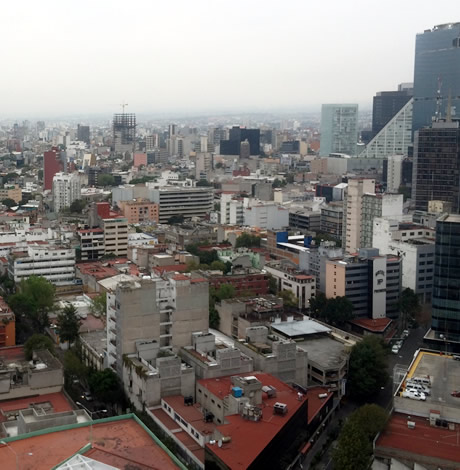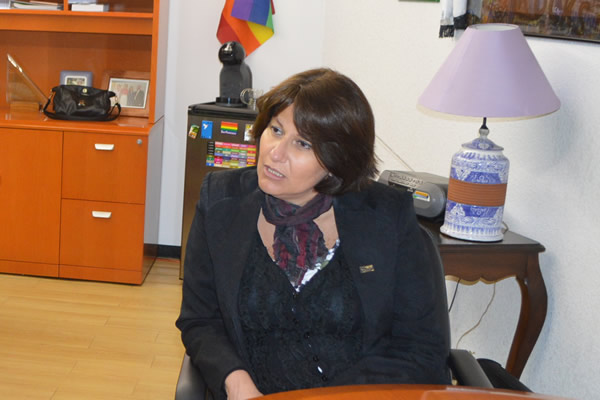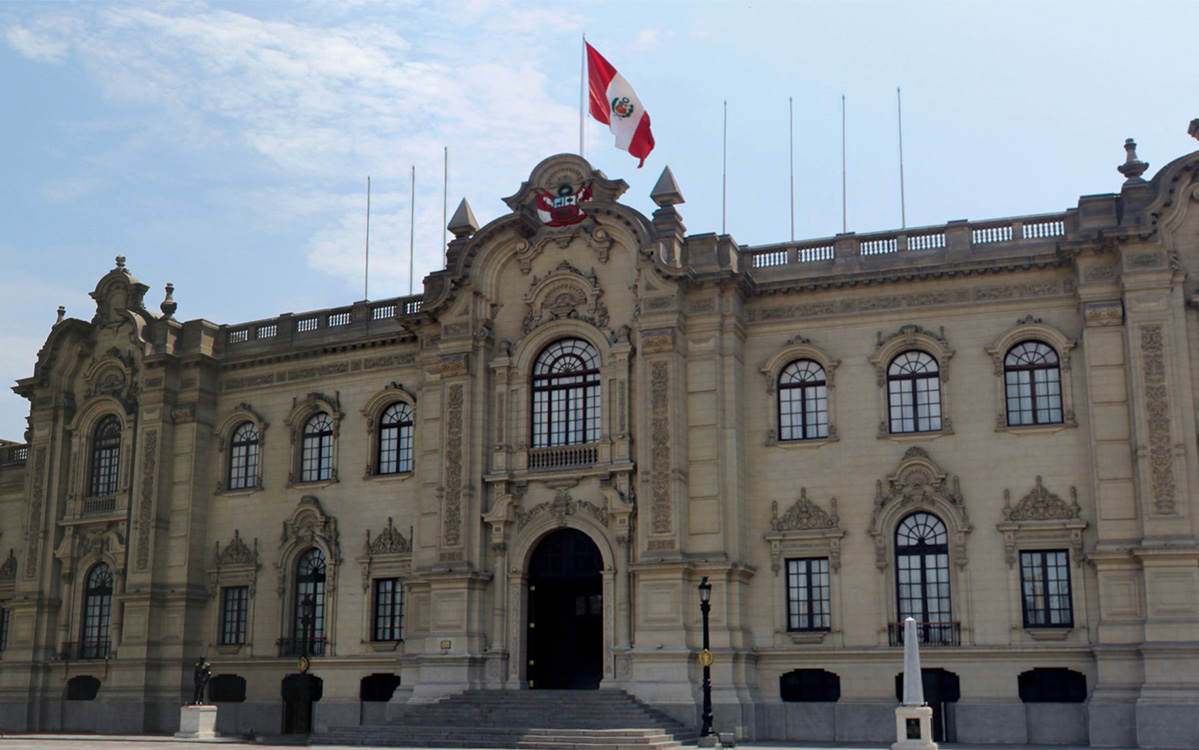News
Mexico City lawmakers approve trans rights bill
Measure to allow legal gender changes without court order


Jacqueline L’Hoist Tapía, president of the Mexico City Council to Prevent and Eliminate Discrimination, supports transgender people’s ability to legally change their gender in the Mexican capital without a court order. (Photo by Angélica Pineda)
Members of Legislative Assembly of the Federal District, in which Mexico City is located, approved the measure by a 42-0 vote margin. Six lawmakers abstained from the vote on the measure that Mexico City Mayor Miguel Ángel Mancera proposed.
Manuel Granados Covarrubias of the Party of the Democratic Revolution, known by the Spanish acronym PRD, welcomed the proposal’s approval.
“It eliminates cumbersome trials and judicial proceedings, procedures, to generate the administrative change of a legal action to which everyone has the right,” said Granados in a press release the Legislative Assembly of the Federal District released after lawmakers approved the measure. “Their dignity is also recognized.”
The Mexico City Commission to Prevent and Eliminate Discrimination, known by its Spanish acronym COPRED, launched a campaign in support of the measure.
COPRED spokesperson René Said Nieto told the Washington Blade that Mexico City on Thursday “took a major step forward” towards the recognition of trans people.
“(The measure) guarantees the rights of people to the recognition of their gender identity,” said the Human Rights Program of the Federal District in a statement.
Mexico City is the first city in Latin America to allow trans people to legally change the gender on their birth certificates without a medical examination. The Mexican capital’s comprehensive anti-discrimination law already includes gender identity and expression and designates transphobia as a form of discrimination.
Argentina President Cristina Fernández de Kirchner in 2012 signed a law that allows trans Argentinians to legally change their gender on official documents without sex-reassignment surgery and an affidavit from a doctor or another medical provider. The Chilean Senate next week is expected to vote on a bill that would allow trans people in the South American country to legally change their name and sex without sex-reassignment surgery.
Supporters of Mariela Castro, daughter of Cuban President Raúl Castro, credit her with successfully lobbying her father’s government to begin offering free sex-reassignment surgery under the country’s national health care system in 2008.
Federal Government
Biden-Harris administration takes major step toward reclassifying marijuana
New regulations could lessen criminal penalties for cannabis

The U.S. Department of Justice on Thursday took a major step toward loosening the federal government’s regulation of marijuana by issuing a Notice of Proposed Rulemaking to the Drug Enforcement Administration, which outlines a proposal to reclassify it under the federal Controlled Substances Act.
The move comes pursuant to the Biden-Harris administration’s April 30 announcement of plans to recategorize cannabis as a Schedule III substance, which could substantially lessen the criminal penalties for those convicted of using, possessing, selling, distributing, or cultivating the drug.
A 60-day public comment period will begin after the NPRM is published on the Federal Register, along with a concurrent review of the proposed regulatory reforms by an administrative law judge assigned by the DEA.
Since the CSA was passed in 1971, cannabis has been listed under Schedule I, the category reserved for drugs that are considered to be the most dangerous and lacking any currently accepted medical use in the U.S.
In a press release, a senior administration official noted that “marijuana is currently classified higher than fentanyl and meth – the drugs driving our Nation’s overdose epidemic.”
President Joe Biden posted a video on X in which he said the proposal to house cannabis under the Schedule III regulatory regime constitutes “an important move towards reversing longstanding inequities.”
“Today’s announcement builds on the work we’ve already done to pardon a record number of federal offenses for simple possession of marijuana,” the president said. “It adds to the action we’ve taken to lift barriers to housing, employment, small business loans, and more for tens of thousands of Americans.”
“Look folks no one should be in jail for merely using or possessing marijuana,” Biden said. “Period.”
The president added, “Far too many lives have been upended because of a failed approach to marijuana and I’m committed to righting those wrongs. You have my word on it.”
Too many lives have been upended because of our failed approach to marijuana.
— President Biden (@POTUS) May 16, 2024
So today, the @TheJusticeDept is taking the next step to reclassify marijuana from a Schedule I to a Schedule III drug under federal law.
Here's what that means: pic.twitter.com/TMztSyyFYm
South America
Peruvian government classifies transgender people as mentally ill
President Dina Boluarte signed decree on May 10

The Peruvian government on May 10 published a decree that classifies transgender people as mentally ill.
Human Rights Watch on Wednesday noted the country’s Essential Health Insurance Plan that President Dina Boluarte, Health Minister César Vásquez and Economic and Finance Minister José Arista signed references “ego-dystonic sexual orientation.” The decree also notes, among other things, “transsexualism” and “gender identity disorder in childhood.
Human Rights Watch in its press release notes the Health Ministry subsequently said it does not view LGBTQ identities as “illnesses.” Peruvian LGBTQ advocacy groups, however, have sharply criticized the decree.
“This decision is an alarming setback in our fight for the human rights of trans people in Peru, and it represents a serious danger to our health and well-being,” said Miluska Luzquiños, a trans activist who works with the Latin American and Caribbean Network of Trans People, which is known by the Spanish acronym REDLACTRANS, on her Facebook page.
A lack of legal recognition and protections has left trans Peruvians vulnerable to discrimination and violence.
Luisa Revilla in 2014 became the first trans person elected in Peru when she won a seat on the local council in La Esperanza, a city in the northwestern part of the country.
She left office in 2019. Revilla died from COVID-19 in 2021.
Africa
Kenyan advocacy group offers safety tips to LGBTQ hookup app users
Blackmail, kidnappings and assaults are commonplace

The growing cases of queer people in Africa becoming victims of blackmail, physical and sexual assault from online hook-ups have compelled a Kenyan LGBTQ rights group to work with the community to help it stay safe when using digital platforms.
Upinde Advocates for Inclusion held a 3-day training from May 11-14 to teach queer people about unsafe social media and dating app hook-up practices that suspected homophobes exploit.
The Mombasa-based group of which Lizzie Ngina is executive coordinator noted lesbian, bisexual and queer women, and gender non-conforming people are the most frequent targets online and on Grindr and other dating apps.
“LBQ women and GNC persons confront major challenges in terms of digital security and data protection, freedom of expression, assembly, association, speech, privacy, protest and online organizing,” Upinde Advocates for Inclusion stated.
Although the digital platforms were seen as convenient meet-up places for LGBTQ people in overcoming physical anti-gay attacks, Upinde Advocates for Inclusion said anti-gay discrimination, marginalization, gender-based violence, misinformation, and disinformation limits LGBTQ and gender non-conforming people from accessing the social media services.
Queer people while using dating apps and social media for hookups were, however, urged to first trust their intuition before deciding to have a physical meeting with people with whom they chat online.
“If it does not seem like someone you are messaging is using their true identity, they probably are not. In this case, do not agree to meet them in person,” Upinde Advocates for Inclusion warned.
It asked LGBTQ users to ensure the first in-person meeting with someone they met online is in a public place that is queer-friendly and known to them. Upinde Advocates for Inclusion also advised queer people to inform their trusted friends or family about their meeting plans, the place, and how long they expect it will take place in order to ensure someone can intervene if something goes wrong.
“Organize your own means of transport to and from the meeting, and do not accept a free ride from a stranger,” the group warned. “Also, do not move to a secondary location if you feel unsure during the meeting.”
Upinde Advocates for Inclusion also warned queer app users to remain sober during the meeting and cautioned against leaving their food or drinks unattended in order to avoid any potential risks associated with spiking.
The National Gay and Lesbian Human Rights Commission, Ishtar-MSM and other Kenyan LGBTQ advocacy groups that offer legal aid to queer people last year reported about 100 cases of blackmail, extortion, physical and sexual assault against their members by suspected homophobes they met on dating apps and social media.
The two organizations this month noted 10 of the cases are expected before courts soon, although they said most victims of anti-gay attacks don’t report them to the authorities because they fear further stigmatization and discrimination. Consensual same-sex sexual relations also remain criminalized in Kenya.
Targeting the LGBTQ community on digital platforms and dating apps is not unique to Kenya.
The Washington Blade last month reported it is still risky for queer Nigerians to search for a partner or to use gay dating apps infiltrated by homophobes who lure them to meet in-person and then rob or assault them. South African authorities last year arrested four men in connection with the targeting of Grindr users.
LGBTQ Kenyans urged to protect themselves at protests
Upinde Advocates for Inclusion in their workshop taught participants about the signs that suspected homophobes or their associates have compromised their devices. They include unusual activities on their cell phones that include calls with untraced history, disappearing blank messages, blinking screens, high data consumption, devices that overheat when not in use and echo when picking calls and quick battery depletion with minimal use.
“If you suspect your device is compromised, do not format or reset it, log out all the accounts, find an alternative device to use, change the password for the accounts on the device, and do not connect the gadget to any other devices,” Upinde Advocates for Inclusion warned.
The group also taught queer people about how they should conduct themselves when taking part in street protests amid anti-gay attacks. Upinde Advocates for Inclusion advised them to always to identify safe alternative routes to and from the protests, wear comfortable running shoes, and always carry a spare outfit that is not LGBTQ-specific.
“If you are in a group, always strategize on having a meeting point should there be any danger or should you get separated,” the group stated. “Also, try to split up responsibilities among the group so that one person can’t be targeted.”
Upinde Advocates for Inclusion also urged queer people to always leave a protest before it ends, to have an emergency contact on speed dial or memorize it for immediate help in case of danger and to always to keep in touch with a trusted contact who is familiar with the protest but not attending it.
-

 Africa4 days ago
Africa4 days agoSouth African president signs new hate crimes, hate speech law
-

 South America11 hours ago
South America11 hours agoPeruvian government classifies transgender people as mentally ill
-

 Africa2 days ago
Africa2 days agoUgandan president meets with US ambassador
-

 LGBTQ Non-Profit Organizations3 days ago
LGBTQ Non-Profit Organizations3 days agoBlade contributor wins GLAAD Media Award









